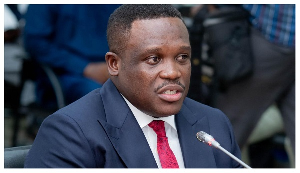 Minister of Communications, Digital Technology and Innovation, Samuel Nartey George
Minister of Communications, Digital Technology and Innovation, Samuel Nartey George
The Minister of Communications, Digital Technology and Innovation, Samuel Nartey George, has provided details on ongoing efforts to reduce data costs in Ghana.
He emphasised that while he cannot unilaterally set data prices, significant policy measures are being implemented to influence affordability.
According to him, a Data Pricing Committee was established and given 14 days to produce a roadmap, but a report was submitted in just 13 days.
“I set up a Data Pricing Committee and gave them 14 days to come to me with a roadmap for implementation. And in 13 days, they submitted their report. It was made up of stakeholders, MNOs, and the regulator.
"So, we had that engagement, and they submitted their reports to me. The report included short-, medium-, and long-term policy reforms that needed to be implemented,” he stated during a press conference on April 11, 2025.
He further stated that the report, which contained short-, medium-, and long-term reforms, has been referred to the regulator.
Meetings have also been held to develop implementation strategies, including specialised data packages for students and gig workers.
“I referred it to the regulator. The regulator has gone on to meet with the MNOs about it. I've met with the MNO CEOs myself regarding the proposed framework. People expect me to simply set data prices, but that’s impossible. What I can do is use policy tools.
"For example, with some of the steps I’ve taken on spectrum allocations and tech neutrality, I’ve used those to negotiate with industry players. I’ve asked them to introduce specific packages, such as cheaper data bundles for students, which are more affordable per megabyte than regular data bundles,” he explained.
The minister continued, “Again, I’ve told them that for content creators and those working in the gig economy, we also want specialised, lower-cost data bundles. These discussions are ongoing. The regulator is finalising the technical modalities for these pricing models, which will soon be rolled out.”
The minister also mentioned ongoing discussions with Google concerning the Equiano subsea cable, which offers high-capacity bandwidth.
He criticised the previous government for missing the opportunity to secure a landing in Ghana, leading to the cable being routed through Togo instead.
“I think that in the medium to long term, we need to do two key things, first, bring in much more bandwidth into the country. I’ve already started conversations with Google about the Equiano cable, which is a high-capacity subsea cable. Because of its new technology, it carries a large amount of bandwidth. Unfortunately, due to shortcomings in the previous administration, Ghana missed out.
“Google initially wanted to land the cable in Ghana. They came here and were even given a licence by the NCA. But due to internal conflicts within the ministry over who got the licence, Google opted to reroute the cable through Togo. Now, it’s going to cost us around $50 million to reroute and create a patch landing here in Accra.
“I’ve held conversations with Google executives, and we’re working to ensure Ghana is included in the second phase of the Equiano project. That would significantly increase bandwidth in the country. And as you know, it’s a matter of demand and supply, the more bandwidth we have, the lower the data prices can become,” he pointed out.
He also highlighted the need for a dedicated telecom tariff to reduce electricity costs for telecom services, along with tax rationalisation to resolve instances of double taxation.
“Another thing we need to address, which I’ve been discussing with my colleague John and will also raise with the PURC, is the creation of a telecom tariff. Electricity is a major cost component in the pricing of telecom services," Sam George said.
He continued, “We have mining tariffs and industrial tariffs, but no dedicated tariff for the telecom sector despite the heavy power usage. A lower telecom tariff would create a ripple effect. I’m also hopeful the Finance Minister will implement a VAT rationalisation. If we address double taxation and the cost components of data and voice services, we’ll start seeing a positive impact on data pricing.
“These are medium-term issues, likely to see results by the end of the year or next year, but we expect to see some initial reductions soon,” he concluded.
RAD/MA
Watch the latest edition of BizTech below: